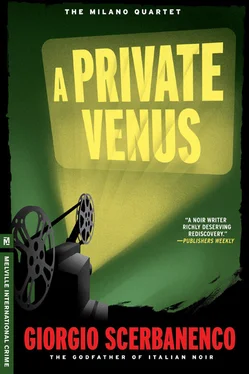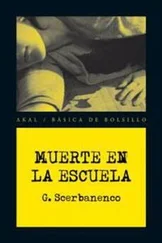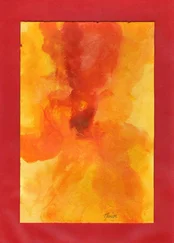Giorgio Scerbanenco - A Private Venus
Здесь есть возможность читать онлайн «Giorgio Scerbanenco - A Private Venus» весь текст электронной книги совершенно бесплатно (целиком полную версию без сокращений). В некоторых случаях можно слушать аудио, скачать через торрент в формате fb2 и присутствует краткое содержание. Жанр: Криминальный детектив, на английском языке. Описание произведения, (предисловие) а так же отзывы посетителей доступны на портале библиотеки ЛибКат.
- Название:A Private Venus
- Автор:
- Жанр:
- Год:неизвестен
- ISBN:нет данных
- Рейтинг книги:3 / 5. Голосов: 1
-
Избранное:Добавить в избранное
- Отзывы:
-
Ваша оценка:
- 60
- 1
- 2
- 3
- 4
- 5
A Private Venus: краткое содержание, описание и аннотация
Предлагаем к чтению аннотацию, описание, краткое содержание или предисловие (зависит от того, что написал сам автор книги «A Private Venus»). Если вы не нашли необходимую информацию о книге — напишите в комментариях, мы постараемся отыскать её.
A Private Venus — читать онлайн бесплатно полную книгу (весь текст) целиком
Ниже представлен текст книги, разбитый по страницам. Система сохранения места последней прочитанной страницы, позволяет с удобством читать онлайн бесплатно книгу «A Private Venus», без необходимости каждый раз заново искать на чём Вы остановились. Поставьте закладку, и сможете в любой момент перейти на страницу, на которой закончили чтение.
Интервал:
Закладка:
She shook her head, she was starting to breathe heavily, it was probably the heat, the room was small, even more hot air came in from the window that looked out on the courtyard. Mascaranti had found the light switch and lit the thing which hung from the ceiling of the room and which revealed itself to be an attempt at a chandelier.
‘What did your sister live on? Did she have a job?’
She knew perfectly well what they meant, and she started speaking. She seemed almost calm, but her face remained, inexplicably, smaller than when they had arrived. Of course, of course, Alberta had found work immediately, as soon as she had arrived from Naples: she had become a shop assistant.
‘Where?’
She told them where, a shop, although the term was a little vulgar: better to say a ‘men’s boutique’ in the Via Croce Rossa, where a young man enters, climbs a small carpeted staircase, and in a softly furnished little room his measurements are taken for a shirt by two young female shop assistants, or if he needs gloves for the car, French ties from Carven, original American pants, or anything else, the two shop assistants, guided by another lady, are always there, and one of the two assistants had been Alberta Radelli.
‘How long did she work there?’
‘Two or three months,’ she wasn’t sure.
Mascaranti was writing everything down.
‘And then?’
‘She left.’
‘Why?’
She couldn’t remember, maybe Alberta had quarrelled with the manageress.
‘And after that?’
One by one, she told them all the places where her sister had worked, those that she knew, including the phone company. Mascaranti wrote them all down and then counted them up: in the year and a half she had been in Milan, Alberta Radelli had worked a total of almost eleven months, most of the time as a shop assistant. More than they had expected. The remaining seven months were taken up with intervals of unemployment.
‘But she also gave lessons, I got a lot of lessons for her.’ The famous arithmetic, history, and geography lessons to schoolboys.
‘How much did she charge per lesson?’
‘Six hundred lire.’
As much as an hourly cleaner but, apart from the social injustice and the debasement of cultural values, Alberta Radelli didn’t have much to play with from these lessons. Cruelly, he turned over the photograph, which for a while he had kept face down, and showed it to her again. ‘You realise your sister was doing something that wasn’t very nice’-look at the photo, he seemed to be saying-‘and I can’t believe you didn’t know anything about it, given that you lived together.’
She nodded, as if to say, yes, she knew something, and Mascaranti was getting ready to write it down, but all she said was that she had occasionally had her suspicions, because sometimes, even when she wasn’t working, her sister gave her twenty or thirty thousand lire to help her with her monthly bills.
‘And where did she say the money came from?’
‘Once she told me she was translating a book from French and that she had been given an advance.’
‘And did you believe her?’
Pitifully, she shook her head. ‘No.’
‘Did you tell her you didn’t believe her?’
She hadn’t really told her she didn’t believe her: she had tried to find out if she had someone, she thought in fact that she did have someone, a man who might not have been very young, quite a generous man, but she hadn’t tried to find out more, otherwise she wouldn’t have accepted the money. In her clumsy way, she was sincere.
‘So you didn’t know,’ he had to be even more brutal, ‘that she earned that money by picking up men, or being picked up by them, different ones each time.’
No, she didn’t know, and finally she began to tremble a little, but without crying, her whole face was visibly trembling, and yet she wasn’t crying. ‘What’s happened? She’s been dead for a year, we’ve already suffered so much, my father and I, what are you looking for now?’
It wasn’t easy to explain what they were looking for and he didn’t even try, because he himself wasn’t sure exactly what they were looking for, maybe the truth, if he didn’t find the very idea of the truth laughable. What is the truth? Does it even exist?
‘All right, you don’t know anything about this,’ he said, putting the photo back in the leather briefcase, ‘but maybe you can tell us something else that could help us. Your sister must have had friends, acquaintances. Did you ever see any friend of your sister’s? Did your sister ever talk to you about anyone?’
The trembling ceased gradually, resignedly, because it’s useless to tremble or cry, what’s the point of it? ‘She always said she was going to see some friend or other, but I can’t remember all of them and anyway she only ever mentioned first names.’
He made her tell him what she remembered, and Mascaranti wrote everything down. The friend she remembered most was the schoolteacher. ‘She hadn’t graduated yet, but Alberta called her the schoolteacher. She came here to the house, once, to pick her up.’
He was interrogating: having been interrogated so many times by the prosecuting attorney at the trial, and also in prison, he was now the one asking the questions, and it was an interesting experience. ‘So you don’t remember the name, is that right, you only knew her as the schoolteacher?’
No, she said, she remembered the name, Livia Ussaro: she must have written it down in the little address book.
‘Thank you,’ he said, ‘could I see this address book?’
She went into the hall, took it from the hook from which it was hanging next to the telephone and brought it in to him. Without looking at it, he put it in the briefcase together with the photograph. ‘I’ll bring it back in a few days.’ Livia Ussaro didn’t sound a very likely name, it might be a pseudonym: start looking for a woman called Livia Ussaro and you probably wouldn’t find anything. And he was getting tired of Mascaranti holding that little notebook that vanished inside his big hands, that little Biro, and the fact that he was writing everything down.
‘Do you remember any other friends?’
‘She mentioned so many. She’d say, I’m going to see Maurilia , or else somebody would phone and say, this is Luisa, is Alberta there? ’
Was she winding him round her little finger, or was it innocence in a pure state, a precipitate of innocence, obtainable only in a laboratory?
‘I was also thinking of men friends,’ he said, patient but already irritable.
‘No, never men.’
Mascaranti ran his Biro through his hair: he wasn’t trying to write on his head, but the woman had said ‘never men’ quite seriously, straight out, it had come from her heart, she wasn’t trying to deceive anyone.
‘The photograph I showed you suggests your sister may have had a number of male acquaintances. Whatever it was she did, she’s dead now, and there’s no point in your trying to cover it up, we’ll find out in the end anyway. Men must have phoned your sister, maybe lots of them, and some may have given their names. Please tell me the truth.’
‘No man ever phoned her,’ she said immediately, and she seemed genuinely sorry that she couldn’t help him.
She wasn’t lying. ‘It’s possible,’ Mascaranti said. ‘Maybe she didn’t let them phone here because she didn’t want to make her sister suspicious.’
While they were about it, they committed another violation of her rights as a citizen and did a quick search of the apartment.
‘Your sister must have left some personal objects here. We’d like to see them.’
Unaware that the constitution gave her the right to refuse, she took them to the one bedroom in the apartment. There were two small beds like the cots of four-year-old children who sleep with teddy bears clutched to their chests, and indeed, on the light wooden headboards, bears, dogs, butterflies, and snails with long horns had been painted. ‘She slept here with me, I left her clothes in the wardrobe, and everything else she had is in that suitcase on top of the wardrobe.’
Читать дальшеИнтервал:
Закладка:
Похожие книги на «A Private Venus»
Представляем Вашему вниманию похожие книги на «A Private Venus» списком для выбора. Мы отобрали схожую по названию и смыслу литературу в надежде предоставить читателям больше вариантов отыскать новые, интересные, ещё непрочитанные произведения.
Обсуждение, отзывы о книге «A Private Venus» и просто собственные мнения читателей. Оставьте ваши комментарии, напишите, что Вы думаете о произведении, его смысле или главных героях. Укажите что конкретно понравилось, а что нет, и почему Вы так считаете.












